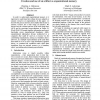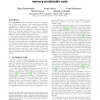2186 search results - page 19 / 438 » Considering an Organization's Memory |
HICSS
2003
IEEE
14 years 29 days ago
2003
IEEE
In order to understand organizational memory, it is important to understand how things become adopted as memory resources in organizations. In this paper, we describe the genesis ...
JTRES
2009
ACM
14 years 2 months ago
2009
ACM
The ScopedMemory class of the RTSJ enables the organization of objects into regions. This ensures time-predictable management of dynamic memory. Using scopes forces the programmer...
EUROPAR
2010
Springer
13 years 7 months ago
2010
Springer
Abstract. In this paper we consider the problem of scheduling on computing platforms composed of several independent organizations, known as the Multi-Organization Scheduling Probl...
HICSS
2005
IEEE
14 years 1 months ago
2005
IEEE
A paradox appears to thwart traditional knowledge sharing efforts in organizations: the greater the benefit of a piece of knowledge to an organization the less likely that it will...
ADHOCNOW
2004
Springer
14 years 1 months ago
2004
Springer
Abstract. We consider the problem of bootstrapping self-organized mobile ad hoc networks (MANET), i.e. reliably determining in a distributed and self-organized manner the services ...


